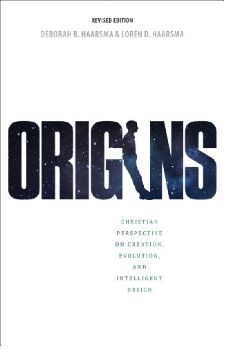Science is an amazing thing! It’s enabled us to transcend so many of our previously existing barriers, from being able to walk on the moon to being able to carry on a live conversation with someone on the opposite side of the planet, from helping us know what makes fevers run hot to knowing what makes stars hot, from giving us the flashlight to the strobe light to the blacklight. It’s an amazing thing, but unfortunately, many seem dedicating to pitting science against Christianity and vice versa.
On the one hand, you have the atheists who have tried to monopolize science as theirs and nobody else’s (Their symbol is an atom for Pete’s sake). On the other hand, you have Christians who insist that a strict, literal, face value reading of Genesis is the only way to read it, and if you deviate from the 7 24-hour day view, you’re a man pleaser and a compromiser.
The Bible and Science both talk about our origins, so it’s no wonder that people would wonder if they’re simpatico. I would affirm that there is no conflict between God’s world and God’s word. There may be a conflict between science and theology, but not between the world and The Bible. Science and theology are both interpretations of God’s world and God’s Word respectively. If the universe and The Bible have the same author, then when both are interpreted correctly, there won’t be any conflict. If there seems to be conflict between our interpretation of Genesis or any other biblical passage with what the scientific evidence seems to be saying, then we should either (1) go back to the biblical passage and re-evaluate whether it seems to be saying what we initially thought it said or (2) carefully consider whether the scientists somehow erred in interpreting the data.
 |
| “Origins: Christian Perspectives On Creation, Evolution, And Intelligent Design” by Deborah and Loren Haarsma |
When it comes to apparent conflicts between The Bible and the universe, many Christians will gladly do 2, but scorn anyone who does 1 on the basis that they’re convinced that 2 is not the case. For example, if someone is convinced that the universe and Earth are both billions of years old on the basis of powerful scientific arguments, they may begin to reconsider whether the Callendar-Day view of Genesis 1 is actually correct. Perhaps The Day-Age view, championed by people like Hugh Ross of Reasons To Believe, is the correct way to interpret the text. Maybe The Framework Hypothesis, defended by people such as Kirk MacGregor and Brad Kramer is the correct interpretation. Or maybe The Bible isn’t talking about material origins at all, but functional origins, as argued by Old Testament scholar John Walton. I think all 3 of these views have their strengths and weaknesses, and these views are totally compatible with what prevailing scientific thought says about the age of the universe and the Earth.
However, young earth creationists like Ken Ham would object to this. Ken Ham, in particular, would and has argued that we shouldn’t “Take man’s word over God’s word” and that allowing science to influence our interpretation of The Bible is putting God’s infallible word in submission to man’s fallible word. Ken Ham has said specifically “Talking about the six days, what we’re really talking about is does it really matter what God says. It’s an authority issue,” and “There has been a battle ever since the beginning between man’s word and God’s Word,” 1
I think one can come to The Day-Age view, The Framework Hypothesis, and The Functional Creation view on exegetical grounds alone (see here, here, and here), but let’s leave the question of whether any of these (or others) are exegetically justified aside. The real question here is this: should we give science any voice whatsoever when it comes to formulating a doctrine of creation? After all, if God’s word is infallible and man’s word is fallible, then why should we care what the latter has to say? Should our interpretations of creation passages be hermeneutics-only, completely void of any scientific input? I’d like to argue that the answer is “no” and give a few reasons why.
Everyone Has Already Allowed Science To Color Their Doctrine Of Creation To Some Extent
First of all, for any YEC to say that his theological views on creation are 100% hermenuetics and 0% is outright false. He may not realize it, but he’s already allowed science to color the way he sees the doctrine of creation to some extent. For example, when he reads John 1:3 which says “Through Him [The Word a.k.a Jesus] all things were made through Him and without Him, nothing was made that has been made” what does he think this means? Obviously, it means that anything that exists, exists because Jesus Christ created it. But what encompasses “all things”? The YEC will most likely say that it encompasses atoms (and the protons, neutrons, and electrons that comprise them), spiral galaxies, DNA, the bacterial flagellum, and many other things. These exist, and according to John 1:3, anything that exists exists because Jesus created it, so that means Jesus made atoms, spiral galaxies, DNA, and the bacterial flagellum.
However, for most of human history, no one even knew these things existed. Concordism VS. Accomodationism debates aside, no one knew anything about atoms or DNA or even spiral galaxies prior to the 19th, 20th, and 21st centuries. Science discovered these things. The Bible never mentions them. If you believe Jesus created molecules, you’re holding a theological belief affected by scientific data. If you believe the billion trillion galaxies are an invention of God’s, then you’re holding a theological view that most people throughout church history have not held to.2 If you believe that that the uncannily computer-code like genetic code known as DNA was programmed by God, then you are holding a theological view that was not held throughout most of church history. Did Peter believe God created DNA? Did Paul believe God created DNA? Did the apostle John believe that God created the bacterial flagellum? No, because no one knew these things existed until relatively recently.
Or what about the nature of the sky? Some argue that Genesis 1:2 is saying that God created the sky as a solid dome (what the word “firmament” means, raqia in Hebrew).3 I know many YECs who would say that that can’t be what is being said in the text. Why? Well, because for one thing, The Bible is inerrant. For another thing, we know from science that the sky is not solid. If it were, the astronauts would have crashed into it in the 1960s. If the sky isn’t solid, then that can’t be what The Bible is saying. Is there any reason exegetically to reject the solid dome interpretation of Genesis 1:2? None that I can tell. It seems like a fairly reasonable interpretation to me, at least when viewing The Bible in a scientific void. This is, yet again, another theological view YECs hold on the basis of scientific evidence.
Many young earth creationists, including Ken Ham, are holding beliefs about creation that come from science and science alone. It would, therefore, be hypocritical to try to argue that science shouldn’t affect our views about creation. It would be hypocritical to argue that science shouldn’t have a voice in the creation controversy. It would be hypocritical for a YEC to say that someone is submitting God’s Word to “Man’s Word” when he concludes that God created over billions of years on the basis of science all the while believing that the reason Noah’s Ark could fit all of the animals was that a small number of “kinds” were put on the ark and then rapid micro-evolution occurred post-flood to give us the diversity of animals we see today. Moses wouldn’t have known anything about micro evolution, yet many YECs appeal to micro evolution to explain how billions of species of animals exist while Noah’s Ark could only hold thousands. Should we let science influence our interpretation of the biblical text? Many YECs are already doing this.
By the way, for reasons why the post-flood micro evolution explanation doesn’t work, see this blog post.
The takeaway point is this: Every Christian allows science to affect their doctrine of creation, not just Old Earth Creationists, and Evolutionary Creationists. And I find nothing wrong with that. There is no biblical mandate that says we cannot take extra-biblical information into account in forming a robust view of reality.
The Bible Is Infallible, Biblical Interpretation Is Not.
Remember my contrast between The Bible and The universe with theology and science. The latter two are interpretations of the former. Neither are fallible. Young Earth Creationists are quick to point out man’s fallibility and the possibility that the prevailing scientific thought might be wrong, but scarcely do they consider that their interpretation of Genesis 1 may be wrong. It’s true that science is not always right. It’s true that scientists may possibly be wrong about something currently considered a fact. However, biblical interpretation is also fallible. There would not be an Arminianism/Calvinism debate or a pre-trib/post-trib rapture debate, or a Continuationist/Cessationist debate if our ability to interpret scripture was infallible. God’s word is infallible, but we can err when interpreting it.
Yet you can point this out to YECs time and again and they will refuse to recognize that they’re conflating their interpretation of scripture with scripture itself. Many will not see this as a matter of differing interpretations, but a matter of believing God’s word. In their eyes, to doubt the 24 hour day view is to doubt The Bible itself!
However, one could challenge the YEC by saying “you are holding up your fallible interpretation against God’s infallible universe.” But that wouldn’t be very helpful. In the case of God’s world and in the case of God’s word, we are dealing with interpretations. The data cannot be wrong, but our interpretations of it can be.
Should we let science influence our doctrine of creation? God has given us two books: the book of scripture and the book of nature. We should let there be a two-way conversation between God’s two revelations, not a one-way conversation.
To Adhere To A Bible-Only (read that as YECist-Only) Way Of Viewing Science Results in YECs Being Guilty Of The Very Thing They Accuse Secularists Of.
To start with a preconceived interpretation of biblical passages and then force-fit scientific data to conform to that interpretation is to fall into the very trap creationists often accuse secular scientists of doing. You can find the claim all over the creationist literature that the primary reasons scientists adhere to an old earth and evolution is because they’re starting with atheistic presuppositions and then they interpret the data in light of those presuppositions, so it’s no wonder that they come to the conclusions that they do. Regardless of whether or not this is true of atheist scientists, for YEC scientists to start off with their interpretation of Genesis and other creation passages and then do science in light of that interpretation commits the exact same error. An old earther or evolutionist can say “Well, it’s no wonder that AIG scientists come to the conclusions that they do. They start off with the presupposition that The Bible teaches the universe is 6,000 years old and then they interpret the scientific data in light of that presupposition.”
I for one am opposed to starting off with any preconceived notions when interpreting scientific data, with the exceptions of presupposing the reliability of logic, our cognitive faculties, and the intelligibility of the universe (the prerequisites to doing science). YECs say “We need to let The Bible speak for itself” all the while not allowing nature to speak for itself. This is hypocritical. When AIG has their scientists agree to a statement of faith that says the universe is 6,000 years old, they are not letting nature speak for itself.
I would argue that once you do that, you’ll find that the heavens are declaring themselves to be billions of years old and that one has to resort to explaining things away and avoiding the plain reading of the data to maintain YECism.
Conclusion
Should we let science influence our doctrine of creation? Why not? We all have already let it interpret our view of the doctrine in many areas, why not let it have a voice in figuring out how long it took God to create and what processes (if any) He used to do so? Additionally, our ability to interpret scripture is just as fallible as our ability to interpret the universe, therefore human fallibility cannot be used as an excuse for ignoring what the science textbooks say on any issue. You wouldn’t just completely ignore a biblical commentary on the grounds of human fallibility. Thirdly, to presuppose any interpretation of the way the universe has to be inevitably leads to biased conclusions. This is true of both naturalists and young earth creationists. Good science is objective science. Good scientists say “Where does the evidence lead?” not “How can we make the evidence fit X”?
—————————————————————-
Footnotes
1: Ken Ham, as cited in “Ken Ham Says That Believing In 6 Days Of Creation Is ‘Litmus Test’ On Biblical Authority”, by Stoyan Zaimov, September 16th, 2016, The Christian Post. http://www.christianpost.com/news/ken-ham-believing-6-days-creation-litmus-test-biblical-authority-169673/
2: Before the invention of advanced telescopes, people believed that our galaxy was the only one that existed. Before that, people didn’t even know that there was such a thing as galaxies at all! It was mainly thanks to modern telescopes that we not only discovered that there were other galaxies out there, but also what types of galaxies exist (such as spiral galaxies and elliptical galaxies).
3: As an accomodationist, I would agree with these scholars. The Bible is filled with what is called “Ancient Near Eastern Cosmology”. That is, the Bible reflects the cosmology of its day. I don’t think this calls the inerrancy of The Bible into question at all, as I don’t think it was God’s intention to teach the recipients of his word cosmology or any other science for that matter. He used the faulty science of the day to express theological truth. For more information on this, see my blog posts: “Hermenuetics 101 – Part 3: Understanding The Cultural Context” and “Why Did God Write A Book?”
Discover more from Cerebral Faith
Subscribe to get the latest posts sent to your email.




